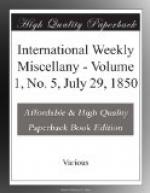PROFESSOR JOHNSON, author of the well-known work on Agricultural Chemistry, has been delivering lectures upon the results of his recent tour in the British Provinces and the United States, in one of which he observed, “In New Brunswick, New England, Vermont, New Hampshire, Connecticut, and New York, the growth of wheat has almost ceased; and it is now gradually receding farther and farther westward. Now, when I tell you this, you will see that it will not be very long before America is unable supply us with wheat in any large quantity. If we could bring Indian corn into general use, we might get plenty of it; but I do not think that the United States need be any bug bear to you.” Prof. J. was in New York last March.
* * * * *
CHARLOTTE CUSHMAN, with Miss Hayes, the translator of George Sand’s best works, was at the last dates on a visit to the popular poetess of the milliner and chambermaid classes, Eliza Cook, who was very ill. Miss Cushman is really quite as good a poet as Miss Cook, though by no means so fluent a versifier. She will return to the United States in a few weeks to fulfill some professional engagements.
* * * * *
Rev. Mr. MOUNTFORD, an English Unitarian clergyman, who recently came to this country, and who is known in literature and religion as the author of the two very clever works, “Martyria” and “Euthanasia,” has become minister of a congregation at Gloucester, in Massachusetts.
* * * * *
BENJAMIN PERLEY POORE, author of “The Life and Times of Louis Philippe,” &c., invited the corps of Massachusetts Volunteers, commanded by him in the Mexican campaign, to celebrate the anniversary of their return, at his pleasant residence on Indian Hill Farm, in West Newbury, last Friday.
* * * * *
Rev. WARREN BURTON, a graceful writer and popular preacher among the Unitarians, has resigned the pastoral office in Worcester to give his undivided attention to the advocacy of certain theories he has formed for the moral education of the young.
* * * * *
RICHARD S. MCCULLOCH, Professor of Natural Philosophy at Princeton College, and some time since melter and refiner of the United States Mint, has addressed a letter to the Secretary of the Treasury, in which he states that he has discovered a new, quick, and economical method of refining argentiferous and other gold bullion, whereby the work may be done in one-half the present time, and a large saving effected in interest upon the amount refined.
* * * * *
THE LATE SIR JOSEPH BANKS lies buried in Heston Church. There is neither inscription, nor monument, nor memorial window to mark the place of his sepulture; even his hatchment has been removed from its place. Surely, as President of the Royal Society, a member of so many foreign institutions, as well as a man who had traveled so much, he should have been thought worthy of some slight mark of respect.




